An Analytical Study of Desires as Cause of the Conflict
Main Article Content
บทคัดย่อ
This research has as its objectives (1) to study of scope and meanings of desire in Buddhism and (2) to analytical of Desires as well cause of the conflict.
This research is a qualitative study based on documentary data from the Tipitaka, commentaries, sub-commentaries, and other documents related to the issues under study. Research findings show that the teaching that can cover all senses of desire is “chanda,” which has a broad scope that includes both good and bad desires. Akusala (bad) desires are called “tanha-chandas” (craving desires) while kusala (good) desires are called “kusala-dhamma-chandas” (virtuous desires). Towards these kinds of desires, Buddhism adopts different attitudes. Since the akusala desires, or tanha-chandas, are related to base pleasures, “kamasukhas,” that give less joy but much harm, the Buddhist attitudes are (a) to renounce, eliminate or destroy tanha-chandas and (b) to use the tanha-chandas to renounce their own kind by using kilesas as upaya to goodness or, in other words, "motivation by rewards." The Buddhist attitude toward kusala desires is that of obligation with an aim of self-cultuvation to attain the highest goal, nibbana. The practice consists of three levels: (a) cultivating basic kusala-dhammas through panca-sila (e.g. abstinence from killing) and panca-dhamma (e.g. loving kindness and compassion) (b) developing intermediate kusala-dhammas through the ten kusala-dhammapadas (e.g. abstinence from killing and stealing) and (c) fostering high kusala-dhammas through the eight maggas (e.g. right view, right aspiration and right livelihood)
Article Details
ทัศนะและความคิดเห็นที่ปรากฏในบทความในวารสาร ถือเป็นความรับผิดชอบของผู้เขียนบทความนั้น และไม่ถือเป็นทัศนะและความรับผิดชอบของกองบรรณาธิการ ยินยอมว่าบทความเป็นลิขสิทธิ์ของวารสาร


